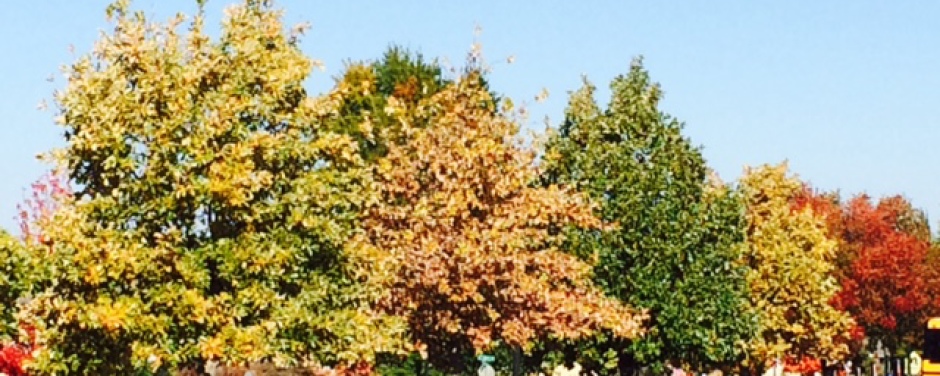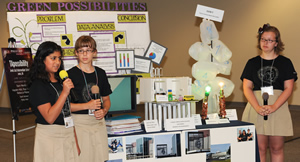NSTA Student Competition Teams to Participate in April 22 (TODAY) White House Science Fair
Student teams from NSTA’s student competitions—Toshiba/NSTA ExploraVision, the U.S. Army’s eCYBERMISSION and the DuPont Science Essay Competition—will join President Obama for the White House Science Fair on Monday, April 22, starting at 11:30 a.m. ET. The president will speak at 2:25 p.m. The event will be webcast live at www.whitehouse.gov/live.
Elementary students Evan Jackson, Alec Jackson, and Caleb Robinson (at right) from Flippen Elementary School in McDonough, Georgia, will present their 2012 National award-winning ExploraVision project “COOL Pads: Shoulder Pads that Keep Players Safe from Overheating.”
Hayden Hilst, Riya Kaul, and Rebecca (Becca) Mackey (at left) from Jenks East Intermediate School in Jenks, Oklahoma, will present their eCYBERMISSION winning project that explored the benefits of using technologically advanced energy and water efficiency devices in their school.
Representing the 2012 DuPont Science Essay Competition will be Mike Espy from Little Snake River Valley High School in Baggs, Wyoming, for his essay titled “Moo-ing Energy,” and Cecelia Poole, from Carvel Academy in Bear, Delaware, for her essay titled “Breathe Easy: Bronchial Thermoplasty.”
The President hosted the first-ever White House Science Fair in late 2010 to celebrate the student winners of a broad range of science, technology, engineering and math (STEM) competitions from across the country. As part of the Administration’s Educate to Innovate campaign, the President told students in 2010 that “If you win the NCAA championship, you come to the White House. Well, if you’re a young person and you produce the best experiment or design, the best hardware or software, you ought to be recognized for that achievement, too.” Congratulations to these teams for their achievements, and plan to watch the White House Science Fair live Monday at 2:25 p.m. ET.
Congratulations to the 2013 DuPont Challenge Science Essay Competition Winners
This year’s winners of the DuPont Challenge researched and wrote about some of the world’s most pressing issues: Feeding the World, Building an Energy Secure Future, Protecting People and the Environment, and Innovative Science. Twenty-six NSTA members judged the nearly 10,000 thought-provoking essays, selecting eight winners. This is quite an honor for the students and the sponsoring science teacher. The winners will receive US Savings Bonds, reference materials from Britannica Digital Learning and NBC Learn, and much more. Grand prize and first runners-up winners along with a parent and sponsoring teacher are packing their bags for an all-expenses paid trip to Orlando, Florida, and the award ceremony at NASA’s Kennedy Space Center. Learn more about these amazing winners of the 2013 DuPont Challenge here.
National Environmental Education Week Resources
Secretary of Education Arne Duncan relates how environmental education can be a tool to improve student health and engagement in STEM fields in a public service announcement for National Environmental Education Week (EE Week). “We know so many of the jobs of the future are in the STEM fields, and there are so many great ties between STEM education and environmental education,” he said. View the PSA here.
To celebrate EE Week, the National Environmental Education Foundation (NEEF) has released a variety of timely resources. Its video toolkit demonstrates lessons that use technology to connect students to the natural world. Its 10 Apps for Taking Tech Outdoors and Tech & Our Planet infographic illustrate the widespread use of technology among kids and adults and possibilities for environmental learning, career pathways, and implications for the economy. NEEF is also sponsoring an Environmental Educator Photo Contest running through May 31, 2013.
Secretary Duncan will also announce the second annual U.S. Department of Education Green Ribbon Schools and first-ever District Sustainability Awardees on April 22 at 10:30 a.m. ET. Honored schools and districts will have an important role to play modeling best practices for all schools who wish to provide an education geared toward the challenges and jobs of the future, which is why the Department of Education will release a report with summaries of each of the honorees.
NSTA Legislative Update: President’s FY2014 Budget Consolidates Major STEM Education Programs
As expected, President Obama’s FY2014 budget request includes a major reorganization of federal STEM education programs, and comprehensive immigration legislation introduced last week by the Gang of Eight contains funding for STEM education. Read all about it in this issue of the NSTA Legislative Update.
NGSS@NSTA
Register for April 30 Web Seminar on Crosscutting Concept; Energy and Matter—Flows, Cycles, and Conservation Prepare for NGSS in your classroom by learning more about the important crosscutting concept of Energy and Matter—Flows, Cycles, and Conservation. This web seminar will be held April 30 from 6:30 to 8 p.m. ET. Join Andy Anderson in this great professional development experience that will explore the role that energy and matter play in science, how student understanding of energy and matter might develop over the course of K–12 education, how learning about energy and matter can take place during the learning of disciplinary core ideas by engaging in scientific and engineering practices, and what studying energy and matter really looks like in the classroom. Visit the NSTA Learning Center to register.
Dive Into NGSS with the NSTA Reader’s Guide to the Next Generation Science Standards The e-book is available now and the print edition coming in May. Written by science education expert Harold Pratt, the publication gives readers a deep understanding of NGSS core ideas, scientific and engineering practices, and crosscutting concepts. To order, visit the NSTA Science Store. View the standards online at www.nextgenscience.org or www.nsta.org/ngss. Want your own print version of the entire NGSS (coming this fall)? Pre-order your print version now at the NSTA Science Store.
Three New Everyday Science Mysteries Books for K–8 Classrooms
Everyone loves a good mystery—and thousands of teachers love the way the Everyday Science Mysteries series gets K–8 students engaged in real experimentation about real science content. Our three new releases in this bestselling series each focus on a specific content area—Earth and space science, physical science, or biological science. The stories come with lists of science concepts to explore, grade-appropriate strategies for using them, and explanations of how the lessons align with national standards. They also relieve you of the tiring work of designing every one of your inquiry lessons from scratch.
Member Price: $20.76 | Nonmember Price: $25.95
Budget-Friendly PD
Scholarships for New Science Teachers—Apply by August 1
Special career-enhancing experiences for middle and high school science teachers in their second through fifth year can be found through the New Science Teachers Academy, a yearlong professional development and mentoring program that offers unique support and resources. Hundreds of teachers will be chosen to participate in the 2013–2014 Academy and take advantage of cost-free, consistent online professional development activities along with face-to-face educational experiences. Simply apply and take control of your career. Principals should consider making this a priority for their newest science teachers.
The Academy provides each teacher with
- Discipline-specific mentoring throughout the year
- Web-based content development courses and other resources
- Membership with full benefits in NSTA
- 2014 National Conference on Science Education attendance, including air travel, lodging, meals, and registration fees
To find out more about the Academy and how to apply for a scholarship, visit www.nsta.org/academy. The application deadline is August 1.
Lab Out Loud Episode 95: Helping Students Imagine Mars
This week hosts Brian Bartel and Dale Basler talk with David Delgado, lead of the Imagine Mars project from the Jet Propulsion Laboratory (JPL). The Imagine Mars Project gives students a chance to work with scientists and engineers to build and design a future human community on Mars. Listen to Lab Out Loud to learn about the project and other educational outreach opportunities from JPL.
Focusing the Lens on STEM
Do you need help implementing engineering concepts in your early childhood classroom? Are skills development in math and science preparing students well enough for integration of technology and engineering into the curriculum? Get hands-on experience and practical knowledge for improving student performance in STEM subjects. Learn how to put an action plan into place. Participate in panel discussions and teacher workshops that include instructional models and activities. Attend NSTA’s second STEM Forum & Expo in St. Louis, Missouri, May 15–18.
Strands:
- PreK–2 (Early Childhood)
- Grades 3–5
- Grades 6–9
- Grades 10–12
- Effective STEM Partnerships
- Administrators
Panel Discussions:
- Successful K–12 STEM Schools
- Common Core and Next Generation Science Standards
- State STEM networks—How Are They Working to Change STEM Education?
- STEM in Urban Science Education and Engaging—and Keeping—More Girls and Minorities in STEM
- Public/Private Partnerships, Out-of-School and Informal Programs that Excite Students to the World of STEM
- Putting the “T” and “E” in Your STEM Program
- A Whole School Approach to STEM: What You Need to Know
- Promising STEM Programs: Three to Watch
For more information, including a list of teacher workshops, visit www.nsta.org/2013stemforum. Register today.
Online Courses from the American Museum of Natural History
Are you interested in learning about evolution? Do you want to know more about Earth or the solar system? Are you looking for graduate or professional development credit? If so, check out the Seminars on Science program from the American Museum of Natural History (AMNH). Online courses run from May 27 through July 7 and include Earth: Inside and Out; Climate Change; The Solar System; Evolution; Genetics, Genomics, Genethics, and more.
Each course is available for graduate credit and is co-taught by an experienced educator and a scientist. For more information, or to register, visit www.amnh.org/learn or contact AMNH directly.
Registration deadline: May 13 Registration: www.amnh.org/learn/Register Phone: 800-649-6715 E-mail: seminfo@amnh.org
Popular Science Magazine/Delta Science Fair
Calling All Teachers! Know a student with a genius idea for a science project that could help make the world cleaner and greener? Here is a chance to share it with the world and win cash prizes! Popular Science magazine in partnership with Delta is hosting its 1st Annual Science Fair and is now accepting submissions for best original science projects in the category of sustainability.
This nationwide competition is open to elementary, middle school, high school, and college students. Judges will select one Grand Prize winner and runner-up winners in each of the four educational divisions. Prizes include cash awards and the chance to see your project in the pages of Popular Science magazine!
To learn more and register, visit www.popsci.com/sciencefair.
Science of Innovation
NBC Learn, in partnership with the National Science Foundation and the U.S. Patent and Trademark Office, looks at the Science of Innovation. More than just a single event or brilliant idea, innovation is a process that anyone from a garage tinkerer to a federally-funded scientist can take to discover new solutions. This 11-part series, narrated by NBC’s Ann Curry, highlights top innovators from across the country working on innovative projects in industries such as healthcare, energy, transportation, and agriculture. Free lesson plans are provided by NSTA.


